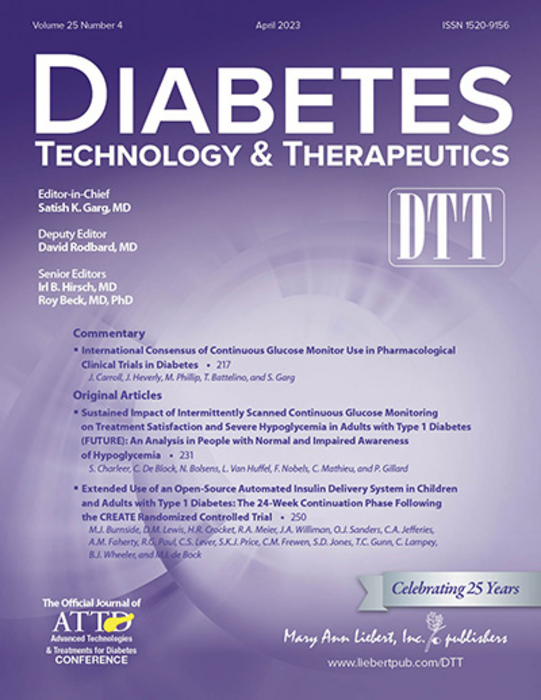A new study evaluated the effect of hybrid-closed loop Control-IQ technology in the pooled data from three randomized controlled trials, comparing Control-IQ to a control group using continuous glucose monitoring in people with type 1 diabetes. The study, which examined subgroup based on baseline characteristics such as race/ethnicity, socio-economic status, pre-study insulin delivery modality, and baseline glycemic control, is published in the peer-reviewed journal Diabetes Technology & Therapeutics (DTT). Click here to read the article now.

Credit: Mary Ann Liebert, Inc., publishers
A new study evaluated the effect of hybrid-closed loop Control-IQ technology in the pooled data from three randomized controlled trials, comparing Control-IQ to a control group using continuous glucose monitoring in people with type 1 diabetes. The study, which examined subgroup based on baseline characteristics such as race/ethnicity, socio-economic status, pre-study insulin delivery modality, and baseline glycemic control, is published in the peer-reviewed journal Diabetes Technology & Therapeutics (DTT). Click here to read the article now.
Roy W. Beck, MD, PhD, from the JAEB Center for Health Research, and coauthors, reported that time in range (70-180 mg/dL) in the Control-IQ group increased from 57%±17% at baseline to 70%±11% during follow up. In the control group the time in range was 56%±15% and 57%±14%, respectively. This represents an increase of 2.8 hours per day on average.
“Significant reductions in mean glucose, hyperglycemia metrics, hypoglycemic metrics and HbA1c also were observed,” stated the investigators. “The greatest benefit was observed in participants with the worst baseline glycemic control in whom the auto-bolus feature of the Control-IQ algorithm appears to have substantial impact,” they concluded.
Editor-in-Chief of Diabetes Technology & Therapeutics Satish Garg, MD, from the University of Colorado Denver, Barbara Davis Center for Childhood Diabetes, states, “Increasing improvements in diabetes technologies has improved glucose control as measured by Time-in-Range with a significant reduction in hypoglycemia as shown above.”
About the Journal
Diabetes Technology & Therapeutics (DTT) is a monthly peer-reviewed journal that covers new technology and new products for the treatment, monitoring, diagnosis, and prevention of diabetes and its complications. Led by Editor-in-Chief Satish Garg, MD, University of Colorado Denver, Barbara Davis Center for Childhood Diabetes, the Journal covers breakthrough technologies and new therapeutic drug classes, behavioral aspects and approaches to diabetes care, and the latest advancements and applications of new and emerging technologies including continuous glucose monitoring, alternate insulin delivery methods, artificial pancreas, telemedicine and computerized case management, new insulins with ultra-rapid onset of action, and detection and prevention of hypoglycemia. Tables of contents and a free sample issue may be viewed on the Diabetes Technology & Therapeutics (DTT) website. DTT is the official journal of the International Conference on Advanced Technologies & Treatments for Diabetes (ATTD).
About the Publisher
Mary Ann Liebert, Inc. is a global media company dedicated to creating, curating, and delivering impactful peer-reviewed research and authoritative content services to advance the fields of biotechnology and the life sciences, specialized clinical medicine, and public health and policy. For complete information, please visit the Mary Ann Liebert, Inc. website.
Journal
Diabetes Technology & Therapeutics
DOI
10.1089/dia.2022.0558
Method of Research
Experimental study
Subject of Research
People
Article Title
A Meta-Analysis of Randomized Trial Outcomes for the t:slim X2 Insulin Pump with Control-IQ Technology in Youth and Adults from Age 2 to 72



